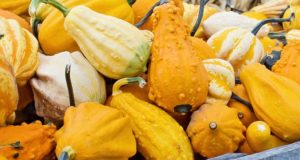When you embrace the homesteading lifestyle, there are a host of questions you must ask yourself. One of the fundamental decisions you must make is what are your goals and aspirations for the scope of your endeavor. In our case, the primary goal was to establish a lifestyle that is as self-sufficient, sustainable, and healthy as possible. Our secondary, but equally important, goal was to generate income from our surplus production. This is what separates the homesteader from the farmsteader. The farmsteader maintains the sensibilities of the homesteader—diversity, sustainability, organic methods, and self-reliance—but broadens the scope beyond simply providing for the family’s needs. Farmsteaders want a commercial element to their operation so that they can meet not only their needs, but can also fulfill some of their wants from the bounty of the land. Farmsteaders generally stay small scale, often producing specialty crops or meats to sell at local farmer’s markets. Deriving revenue from the land allows the farmsteader to step even further out of the rat-race; this is an offshoot of the desire for independence and self-sufficiency.
If you decide that you want to take your homestead to the next level, it is not always as simple as loading your boxes of tomatoes and cartons of eggs into the truck and heading down to the market on a Saturday morning. There are definitely things to know before you head out to sell your produce.
The first thing you need to know, before you plant your first seed or start your first run of Cornish cross chickens, is your market and customer base. For example, are your potential customers interested in organically grown heirloom tomatoes, with all their colors, shapes, and imperfections, or are they just interested in fat, round, red tomatoes like they see in the store? Are they interested in paying a premium price for GMO-free chicken? Do they like to try unique blends in jams and preserves, or are they a grape jelly crowd? If you don’t know your market, you may find yourself canning a lot of heirloom tomatoes and eating a lot of chicken. A good crop of the wrong product can net you about as much profit as no crop at all. There are customers out there for just about anything you can produce, but are they at your market or do you know how to find them?
Once you have evaluated your market and decided on your crops, you should learn the rules of your chosen farmer’s market and any state and local laws that may apply to you.
Some markets require vendors to grow using organic principles. Some require that any meat products come from pasture-raised animals. Some will require a product liability insurance policy. All markets have rules, and you must learn and adhere to them if you hope to establish a long-term relationship with that market and an outlet for your products.
New Survival Seed Bank™ Lets You Plant A Full Acre Crisis Garden!
Some municipalities require vendors at farmer’s markets to have a business license. Most states will require you to have a tax ID and to collect sales tax. Collecting sales tax may require the posting of a bond. It will almost certainly require quarterly reports and remittances. In Missouri, we are required to have a specific license to sell eggs. If you intend to sell graded eggs, it will require a scale certified by the division of weights and measures. In fact, if you intend to sell anything by the pound, you will need a certified scale with a current inspection; your old kitchen scale won’t cut it. These are the reasons we sell by the piece or the bag, and why we don’t sell eggs.
Once you have grown your crops, learned the rules, squared away any licensing requirements, and set yourself up as a sales tax collector, you need to know the cost of your market. Some markets have an annual fee. Others have a daily fee. Still others charge a percentage of gross receipts. Knowing the cost of your space at the market will aid you in determining the price of your products.
When you start selling at the market, you should have a good idea of what your supply will be like. Customers at farmer’s markets want to establish relationships with their favorite vendors. Knowing the projected availability of your crops will help you establish that relationship. Customers want to know that you will be at the market with your products on a regular basis. If you come and go seemingly at random, they will not want to invest their time in you. There is probably a guy two booths down from yours who is there every Saturday with a consistent supply of produce, who can tell customers exactly what he will have next week. Consistency and communication are important aspects of achieving a relationship with your customers.
If you intend to sell any baked or canned goods, you will need to familiarize yourself with health department rules. Baked goods may or may not require a commercial kitchen. Certain canning processes may require you to take classes and be certified. These rules change from municipality to municipality. Don’t assume that what is okay at one market will be okay at every market. Do your homework on these issues, as it can be very inconvenient to be in violation of health department rules.
Many markets will require a site visit by a market manager. This is to confirm that you are an actual producer, not a reseller. It is also an opportunity for the manager to check you over for any potential problems. Are your facilities clean and well maintained? Is your livestock healthy? Is there a fifty-five gallon drum of DDT under a tarp behind your barn? Site visit day is a good time to be a wired-tight knowledgeable professional. There are no second chances at first impressions.
Remember when you were a kid and wanted to set up a lemonade stand? Taking your produce to the farmer’s market isn’t that simple anymore. There are rules and regulations to abide by. There are business practices to learn. There is a bit of market research, if you want to succeed. There is a lot to know, but it is not daunting and the rewards can be well worth the effort.
 Off The Grid News Better Ideas For Off The Grid Living
Off The Grid News Better Ideas For Off The Grid Living





